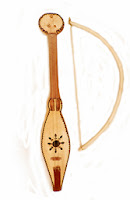The
most characteristic traditional instruments of Georgia are the chordophones: the panduri, the chonguri and the changi (in the
Svanetia region, north-west of Georgia).
Some
instruments of Georgia are played in other Caucasian countries (e.g. Azerbaijan,
Armenia), specially the aerophones and and membraphones instruments.
In
Tbilisi and other cities imported Caucasian or Persian instruments such as saz,
ud, rabab and duduk (in Georgian: duduki) are played. The accordion (garmon), the concertina (buzika) and even the Spanish guitar has
been adopted as instruments of accompaniment. Urban music with western
harmonies using guitar accompaniment is being popular in the cities and around
the country. e.g. Listen to the song "Suliko" in youtube.
Panduri. It is the most popular. It is a plucked fretted lute with three strings. The resonance
box is hollow and with a boat shape. The shape may change according to the
regions and maker. In eastern Georgia mountains is used the Mtiuluri panduri (fanduri)
with a lengthened boat shape resonance box. The panduri is used as accompaniment
of dances and songs.
 |
| Panduri |
 |
| Panduri |
-1-Blog.jpg) |
| Fanduri * |
Chonguri.
Plucked unfretted lute with four strings. It is usually played by women.
Chianuri.
Two/three bowed instrument. There are no frets in the neck. The resonance box is
rounded with stretched leather. It is played with a bow. The chuniri it is a
similar instrument played in Svanetia.
Changi.
Triangular harp. It is very popular in Svanetia. A similar instrument can be also
found in Abkhazia as ayumaa and Ossetia as duodastanon.
 |
| Changi |
Larchemi/Soinari.
Panpipe with six cane tubes. Different sizes and tunings. Played by megrelians
and gurians, respectively, of western Georgia and close to Black Sea.
Salamuri.
Whistle flute made of cane or wood with 6-8 finger-holes. It is similar to the Azeri
tutek and Armenian tutak.
 |
| Salamuri |
Pilili.
Reed wind instrument used in West of Georgia as accompaniment of dances and
comic songs.
Gudastviri.
Bagpipe with two melody pipes and no drone. “Guda” means bag and “stviri” means
pipe. The Chiboni is a bagpipe played in the south of Georgia. It is popular in
Ajaria region. It is similar to the Armenian parakapzuk and the Turkish tulum.
The meskhetians in the south of Georgia, bordering Turkey, they also use the
word tulum.
 |
| Chiboni * |
Stviri.
Flute made of cane. Played by herdsmen and children.
| Stivri * |
Bul-buls.
Ceramic small whistles. The bird shape is the most common. Similar to Armenian pepuks.
Buzika.
Caucasian concertina used for dancing and accompaniment to songs.
Diplipito.
Small ceramic double kettle drum with leather membranes played with sticks
(similar to Azeri gosha nagara and Armenian nagara).
 |
| Diplipito * |
Daira.
Frame drum or tambourine with jingles (similar to Armenian daf and Azeri dyaf)
 |
| Daira |
Ensembles
Georgian common
ensembles use the salamuri, chonguri and panduri; panduri and daira; changi
and chuniri; chiboni and dholi. Other Caucasian
instruments may be used as an ensemble of a pair of dudukis accompanied by dholi and an
accordion accompanied by a clarinet. In the picture below you can see a male choir with women holding a panduri, and other instruments such as the accordion (garmon) and doli.
 |
| Kakhetian Choir |
Other
Caucasian instruments from other non-Gerogian regions
Duduki: Wind instrument with a sweet and mellow sound. It is very popular in Armenia, being the most famous Armenia player Djivan Gasparyan.
Apkhyarta.
Bowed instrumend of 1-2 strings played in Abkhazia.
 |
| Apkhayarta |
Shichepshin.
Bowed two string instrument with a spindle shape body of the Adygei region of
Russia. http://englishrussia.com/2012/01/14/preserving-adygei-traditions/
*: Pictures taken in State Museum of Georgian
Folk Songs & Musical Instruments.









